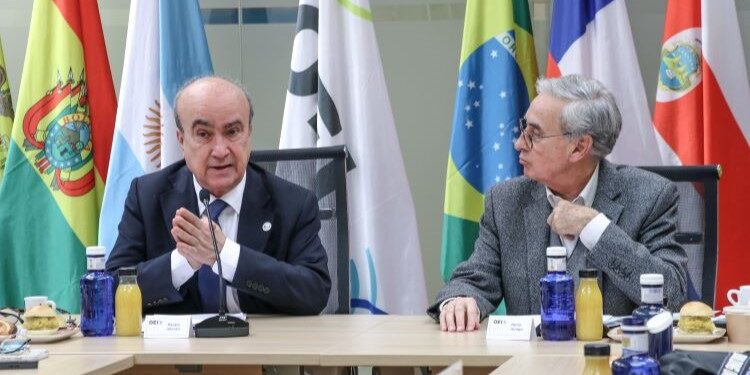The Diplomat
The Organization of Ibero-American States for Education, Science and Culture (OEI) has launched the initiative ‘Latin America in democracy’, a platform for the defense of democratic values in the region, through dialogue, consensus and proposals aimed at social welfare.
The initiative was presented last Thursday at the headquarters of the General Secretariat of the OEI in Madrid by its two promoters, Mariano Jabonero, secretary general of the organization, and Ramón Jáuregui, former Minister of the Presidency of Spain and MEP for several legislatures, in the presence of several Ibero-American personalities and authorities.
“At a time of growing distrust in institutions, both in Europe and in Latin America, this project will seek to create a space for reflection and action to respond to the challenges facing current democracies,” the organization said in a press release. “Through the generation of information, knowledge and dialogue with the participation of specialists and authoritative voices in the field, the platform will promote governance, the strengthening of public policies and the promotion of a culture of peace,” it added.
During his speech, Jabonero stressed that “the OEI, as the leading organization in the Ibero-American system, seeks, through this proposal, to contribute to dialogue and communication to strengthen democratic values, an essential educational, scientific and cultural task.”
“This platform was born at a historic moment in which the OEI has already turned 75 years old, is an observer of the United Nations system and has been recognized with the Princess of Asturias Award, in addition to the fact that we have supported Brazil’s presidency of the G20, where we launched an agenda against hunger and poverty. This gives us a political projection space that we want to put at the service of the community,” added Jabonero.
For his part, Ramón Jáuregui stated that the “purpose is for the project to become a bridge between the concerns of citizens and the spaces for deliberation, and thus contribute to generating consensus and solutions.” “We understood that the crisis of democracy is spreading. The reasons that explain this decline of democracy are growing, there are now problems with large network technology companies and misinformation. The idea is to contribute an initiative taking advantage of the platform that the OEI has,” he added.
‘Ibero-America in democracy’ is articulated around several strategic objectives, among which the identification and approach to the problems that affect the democracies of the region stands out, such as the erosion of the rule of law, deficiencies in electoral processes and tensions between the powers of the State. Likewise, it will promote the role of education, culture, multilateralism and international cooperation as fundamental pillars for democracy in the region.
The event was attended by Andrés Delich, deputy secretary general of the OEI; Manuel Campo Vidal, journalist and president of Next Education; Fernando Carrillo, vice president of the PRISA Group; Erika Rodríguez Pinzón, director of the Carolina Foundation; Ana Paula Laborinho, general director of Multilingualism at the OEI; Carlos Malamud; principal investigator at the Elcano Royal Institute; Carolina Bescansa, professor at the Complutense University of Madrid and former member of parliament of Spain; Cándido Méndez, former general secretary of UGT; Carmen Martínez Castro, general director of the La Toja Forum; José María Lassalle, former secretary of State for Culture of Spain, and María Bensadón, coordinator of the project.
‘Ibero-America in democracy’ will include a digital space focused on the generation of ideas and dialogue, which will have an Editorial Committee made up of experts of recognized prestige from both sides of the Atlantic, authoritative voices in areas such as democracy, human rights, communication and social justice. In this sense, this digital platform will offer the public articles and audiovisual materials on key topics such as human rights, immigration, sustainability, interculturality, transparency and participation, among others.
On the other hand, the project will include the holding of discussion panels to analyze the challenges and opportunities of democracy in Latin America, as well as seminars and workshops in university spaces, bringing reflection to young people and leaders in the region. In addition, this initiative will promote cooperation with multilateral organizations and educational institutions, in order to align their actions in the global context and integrate existing educational and cultural programs in the region.
The first issue of the digital publication will be published in March with articles and opinion pieces written by members of the Editorial Committee, as well as other invited experts, and will focus on education and democracy. A high-level face-to-face event is also planned for the end of the year in Madrid.







